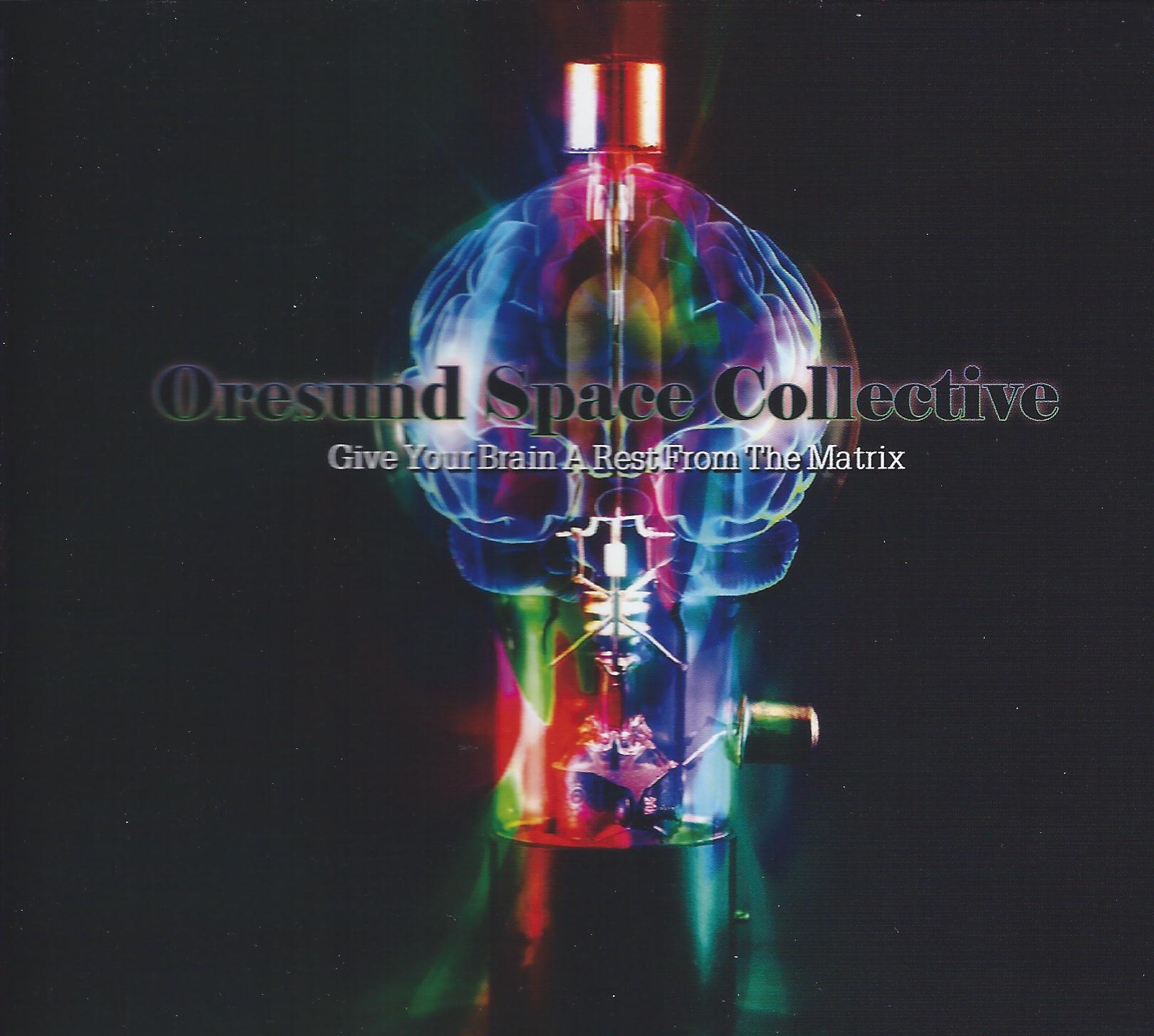 Since being formed by Dr. Space (aka Aural Innovations’ own Scott Heller) in 2004, Oresund Space Collective have been recording and touring at an amazing rate, with Give Your Brain a Rest from the Matrix being their 14th proper release, although the number of limited edition releases using one format only (such as the vinyl-only Entering the Space Country and Phaze Your Fears from 2011 and 2012 respectively) make it hard to keep track of just what is out there. This CD release (limited to 500 copies only, although possibly to be released as a double LP at some future point) was recorded at the same session – Sept 26th 2010 – that produced Space Country and Fears. To find another instance of just one single session producing enough material for three different albums, one would have to go back to the legendary Amon Duul session of 1968, which birthed several rather unlistenable albums. Fortunately, the four lengthy tracks on Give Your Brain a Rest from the Matrix contain far more musical depth than the acid-drenched communal noodlings of the original Amon Duul.
Since being formed by Dr. Space (aka Aural Innovations’ own Scott Heller) in 2004, Oresund Space Collective have been recording and touring at an amazing rate, with Give Your Brain a Rest from the Matrix being their 14th proper release, although the number of limited edition releases using one format only (such as the vinyl-only Entering the Space Country and Phaze Your Fears from 2011 and 2012 respectively) make it hard to keep track of just what is out there. This CD release (limited to 500 copies only, although possibly to be released as a double LP at some future point) was recorded at the same session – Sept 26th 2010 – that produced Space Country and Fears. To find another instance of just one single session producing enough material for three different albums, one would have to go back to the legendary Amon Duul session of 1968, which birthed several rather unlistenable albums. Fortunately, the four lengthy tracks on Give Your Brain a Rest from the Matrix contain far more musical depth than the acid-drenched communal noodlings of the original Amon Duul.
A true collective, rather than a band as such, Oresund have featured over 30 different musicians in their line-up, most of whom have connections to other Scandanavian/European spacerock ventures. For example, Matrix features First Band from Outer Space guitarist Johan Dahlstrom on one track, and Secret Saucer synth-player Steve Hayes on another. However, by far the most notable guest contribution comes from Siena Root’s enigmatically-named KG, whose sitar is all over much of this album. No stranger to the OSC family, KG provided sitar-stylings on 2009’s Good Planets Are Hard to Find, probably the closest touchstone for Matrix in the Oresund back catalogue. If, as stated in the sleeve notes, Give Your Brain a Rest from the Matrix is all about unplugging from the soulless and potentially isolating technologies of the internet, smartphones and headphones which block out the “real” world, the opening track serves as a mighty call to… let go, relax and drift! A lengthy ambient-folksy sitar/guitar intro sets the mood, and the music seems to almost hold its breath for five minutes in anticipation before tabla-style percussion, guitar, bass and synths bring in a gentle groove, which flows across the remaining 20 minutes. This is definitely “world” music, although the world in question may not be Planet Earth. First Band’s Johan provides bluesy guitar on Mainstream is the New Acid, probably the most “conventional” (if such a word can be used in the worlds of OSC) track on the album, which includes a cracking guitar solo around the ten minute mark. Sitars make a return on the nine minute Step into the Other World, while gentle waves of guitar (courtesy of Claus Bohling and Mathias Danielsson) break against eastern shores. The interweaving patterns of guitar and sitar make this otherworldly invitation a most inviting one. Insistent bass and drum grooves give Cerebral Massage (the twenty-seven minute album closer) more of a rock feel, enhanced by KG’s bubbling and swirling Hammond organ, and stabs of wailing guitar. After a brief breakdown session about halfway through, the driving guitars and Hammond return for the most spacerocking section of the album.
The relaxing and terrestrial nature of much of the music on Give Your Brain a Rest from the Matrix means that this album might not be an ideal point of entry for anyone searching for spacerock sounds in the OSC catalogue (2007’s The Black Tomato would probably be the ideal place to start), but it does provide a welcome, if temporary, respite from the relentless encroachment of 24/7 information technology into the world of the listener.
Access the band websites at http://www.oresundspacecollective.com and http://oresundspacecollective.bandcamp.com
Scott “Dr Space” Heller can be contacted at oresundspacecollective@gmail.com
The CD is distributed by Record Heaven at http://www.recordheaven.net
Reviewed by Pat Albertson
